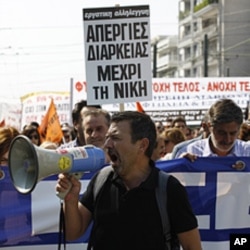As economic crises intensify in Europe, governments are cutting budgets and ordinary people are tightening their belts. Even richer countries, like the Netherlands, are bracing for hard times to come.
Amsterdam's residents took full advantage of the past week's unusual warm and sunny days, setting out chairs alongside the city's many canals to drink and talk. Others, like 32-year-old Sam Van de Pol, wandered through outdoor markets, checking out stands selling cheese, clothes or vegetables.
Van de Pol is bracing for stormier weather. Not the impending winter, but chances that economic growth in prosperous Netherlands may slow down. He is out of work, and fears his unemployment benefits may shrink next year.
"And even if it's not so much consequences for me, I'm already in the system, there will be some serious consequences for the people who are not in this position and who need this kind of help," he said.
Fall out of eurozone's financial crisis
While tough austerity measures in debt-strapped Greece have sparked massive protests, the fallout of the eurozone's financial crisis is beginning to be felt elsewhere.
Banks in Germany and France that have lent massive amounts to Greece, Portugal and other struggling economies are beginning to teeter. Fears are growing that taxpayers in richer nations like the Netherlands will be bailing out poorer ones. And a slew of recent forecasts, including one by the International Monetary Fund this past week, are revising down growth estimates across the 17 nations that use the euro currency.
Even countries outside the eurozone, like Britain, are passing austerity budgets. In an address to his party this week, British Prime Minister David Cameron tried to rally Britons for the hard times ahead.
"I know how tough things are," he said. 'I don't underestimate for one minute how worried people feel - whether that's about making ends meet or the state of the world economy. But the truth is, right now we need to be energized, not paralyzed, by gloom and doom."
Uncertain future
In France, Parisians like 45-year-old business owner Marc Bakous are uncertain about the future.
The problem, Bakous says, is that nobody knows what's going on. The government doesn't say much. People are afraid; they don't know how the government is going to get out of the larger financial crisis.
Like Britain, France also is cutting spending, an unpopular move just a few months before presidential elections. Opposition parties have been quick to criticize a new 2012 austerity bill introduced by President Nicolas Sarkozy's conservative government.
In an interview on French radio, leading presidential hopeful Martine Aubrey of the opposition Socialist Party said that while France's budget deficit needs to be reduced, the country also needs economic growth, jobs and more competitiveness.
Vivien Pertusot, head of the Brussels office of the French Institute for International Relations, says these concerns are reflected elsewhere in Europe.
"People are increasingly realizing that the crisis is going to be hitting very, very hard. It's been difficult already, but it's going to be more difficult in the coming months and the coming years. This is something everyone understands and fears," said Pertusot.
In Amsterdam, the financial crisis still feels very far away. Some Dutch, like Joris Montens, who owns an art gallery, also feel stronger for having survived the last economic downturn, in 2008.
"My first experience in selling art was to law firms and other kinds of enterprises, who just in the downturn of 2008 decided not to buy art any more. If a company has to let go of 20-30 persons, then it's not the best time to invest in art," Montens.
But Montens got creative, handing out flyers door to door to attract new customers to his gallery. Today, he believes the solution to Europe's financial crisis is not just an economic one, but a human one. He believes richer Europeans should help out poorer ones, and ensure that the fundamental concept of a European Union survives.




